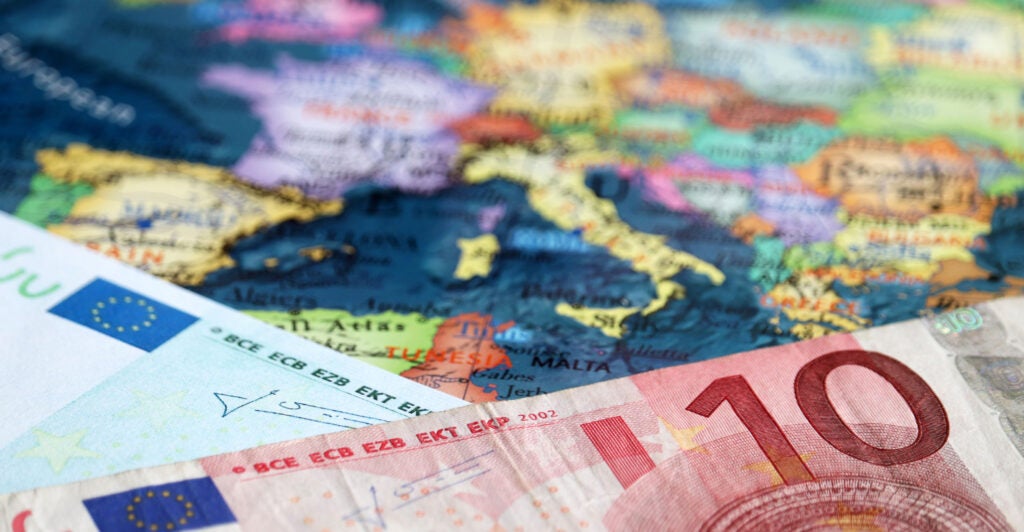Editor’s note: This is a lightly edited transcript of the accompanying video from professor Peter St. Onge.
New numbers say the European Union has joined Japan in the “lost decades” brigade, with per-person gross domestic product in dollar terms nearly flat since 2008.
According to the Organization for Economic Cooperation and Development, while disposable household income in the U.S. is $51,000, it’s just $39,000 in Germany, $34,000 in France, $29,000 in Italy, and $21,000 in Greece. For perspective, Mexico is about $16,000.
Why is Europe fading? Simple: Government took over. Government spending is nearly half of Europe’s GDP, which hogs physical resources—steel, workers, etc.—while predatory tax rates punish production and welfare tempts workers away. Nobody produces, everybody takes.
Add in mandates from environment to social policy that hike prices and slap straitjackets on companies, and the smart ones leave, the rest grimly soldier on, staying in business till their factories wear out, then it’s lights out.
In short, it doesn’t pay to produce in Europe. Atlas is shrugging.
What’s driving the takeover is a toxic combination of vote-buying welfare and crony handouts to corporations. I’ve mentioned in previous videos Europe’s stream of trillion-dollar “stimulus” bills that went to corporations, while welfare spending consumes 1 in 3 dollars in countries such as France and Italy. In the U.S., it’s still high, at 23%. In South Korea, for comparison, it’s 15%.
While the corporations feast on government handouts, the taxes that sustain Europe’s welfare state come from the small and medium businesses, who are getting wiped out. Today, the U.S. has 33 million small businesses. Europe, with one and a half times the population, has just 24 million. Half as much per capita.
The difference is even greater with new startups. Europe’s venture industry is six times smaller than the U.S., which has just two-thirds of Europe’s population.
Moreover, very little of this European money is actual innovation: Europe has missed every tech revolution since basically 1910, instead either copying U.S. business or exploiting government handouts from climate to so-called national champion mega-corporations. To give a flavor, over 90% of artificial intelligence venture money is happening in America, with Europe straggling along with a couple chatbots.
Tallying it up, governments in Europe spend 49.6% of GDP, roughly a quarter more than the U.S., which spends 40%. Not that 40% is great; traditionally we were closer to 20%. But apparently that last couple trillion breaks the bank.
Incidentally, countries such as Singapore do spend just 18% of GDP on government, but have safe, clean streets and grow at 3%-4% per year. So, it’s not science fiction; stagnation is a policy choice.
Sadly, all of this was predictable. In 2013, the Brookings Institution issued a white paper warning of a lost decade in Europe if they didn’t fix government governments and shrinking private sectors.
Alas, true to form, European bureaucrats didn’t fix it. Instead, they doubled down on the welfare spending, the crony handouts, the tax hikes, and the political mandates. As a result, since 2000, roughly 1 in 5 publicly listed European companies have either left Europe or gone out of business. The 5,500 companies left average just one-third the size of listed firms in America.
Europe is strangling itself. So, what’s next?
In theory, European voters would wake up and demand change. In practice, the political elite in Europe has instead abused democratic institutions to shut out or even censor any criticism of the corporatist welfare state that’s dragging Europe under.
We publish a variety of perspectives. Nothing written here is to be construed as representing the views of The Daily Signal.
